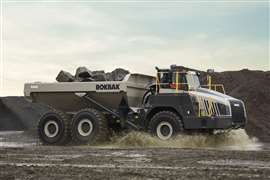RentalTracker: Europe on the up
14 April 2015
New year, new positivity. That was the overriding message from the latest RentalTracker survey, jointly organised by the European Rental Association and International Rental News and the first of of 2015.
In all categories - including key indicators such as fleet investment and employment intentions during the next 12 months - the companies who responded said they felt things were getting better rather than worse, sometimes overwhelmingly so.
For instance, 60.2% across Europe said they expected business conditions a year from now to improve, compared to only 8.2% who took the opposite view. That positive balance of opinion of 52 was the highest anywhere in the survey and the highest in its own category since the fourth quarter of 2013. It was almost twice the preceding quarter’s level of 29.5.
Even in areas where companies may have been expected to be a bit more measured in their projections, scores were high. Those who expected fleet investment to be higher next year totalled 45.1%, against only 14.6% who thought otherwise. The differential of 30.5 was almost three times the corresponding level at the end of 2014.
Of course it is necessary, essential even, to be cautious when taking these figures at face value.
The sample size was slightly smaller than usual, perhaps reflecting the end of the first quarter coinciding with an earlier Easter and the business end of Intermat preparations.
And the comparative base for many of the value judgements expressed in the responses was this time last year, when confidence in the European rental market was far lower than it is now.
But if the RentalTracker’s job is to provide a snapshot of that market as it stood at 31 March 2015, the conclusion has to be that things are looking better.
Indeed, as one early respondent to our related IRN100 survey - the results of which will be published in the June issue of IRN - said: “It’s a pleasure to have the time to fill in these questionnaires now the market has picked up!”
In summary, these are the pan-European headline numbers from the first quarter of 2015 (all figures expressed as percentages, some totals may not equal 100% due to rounding):
Business conditions now: better 35.9, same 47.6, worse 16.5, balance 19.4 (Q4 2014: 8.4)
Compared to a year ago: 37.8, 39.8. 22.4, 15.3 (18.8)
Full year compared to previous year: 51.5, 35.1, 13.4, 38.1 (37.0)
Forecast, year from now: 60.2, 31.6, 8.2, 52.0 (29.5)
Time utilisation: 34.6, 44.4, 21.0, 13.6 (21.6)
Fleet investment this year: 35.4, 42.7, 22.0, 13.4 (6.4)
Fleet investment next year: 45.1, 40.2, 14.6, 30.5 (10.6)
Employment intentions: 31.0, 59.8, 9.2, 21.8 (13.9)
If Europe’s rental market in 2014 was the tale of a north-south divide, this is reflected in the respondents’ views of current business conditions, though less markedly that one might have imagined.
By far the most optimistic were the Nordic countries. Nearly three-quarters of respondents felt that business conditions were improving and only 9% believed they were getting worse. The confidence in Nordic economies was borne out by activity during the quarter that included a €40 million deal for Ramirent as part of a prestigious construction contract in Stockholm, and the recently announced acquisition of Rent City in Karlstad by Stavdal.
Germany was similar, with more than 90% split equally between “improving” and “stable”. The UK, despite a quarter that concluded with the start of General Election campaigning, was more cautious, with only 30% saying conditions were getting better.
In fact, the UK - historically one of the strongest performers both in terms of rental business and completing the survey - was one of the countries with fewer responses this quarter, which gives the confidence shown elsewhere in Europe greater significance.
Further towards the equator, half of Spanish companies said business was getting better, perhaps an inevitable conclusion given the downturn in recent years. However, despite similar conditions, France was the most pessimistic country in the survey, with 50% in the “deteriorating” camp and only 6% prepared to suggest the corner had been turned.
Of Italian respondents, 40% said conditions were improving. Italy was the only major country where no one believed business was getting worse - a distinction shared by multinational companies, who were equally split between “improving” and “stable”.
The only country with no respondents who felt business conditions were improving was Russia, though as in the final quarter of 2014 this was based on a small sample size and should be treated with caution.
It was probably not surprising in the light of the above that the Nordic countries had the best opening quarter compared to 2014 as well. Indeed, the Nordic countries were the only group with more than half of respondents reporting an improvement in business activity of more than 10%.
Taking minimum growth of 5% as the benchmark, Italy had the second best result. Perhaps fittingly in a year when it will host the European Rental Association Convention and Awards, more than 60% of Italian companies who took part in the survey reported this level of improvement. The UK was third, though most of its companies’ growth was between 5 and 10%, highlighting a cautious approach influenced by economic fluctuations in the country in recent years. France was the only country with no respondents claiming any net growth at all compared to the previous year.
In terms of individual countries, Germany showed the biggest difference between its experience in the opening quarter and its expectations for the full year of 2015. Whereas less than a third of companies felt they were currently doing more business than last year - a smaller percentage than anywhere except France or Russia - more than half said this would be the case at the year end.
The Nordic countries also showed increased confidence, from 64% reporting current growth of at least 5% to 82% expecting it further down the line. In absolute terms, the UK’s return was exactly the same for both questions, but the year end total was three times as high in the category for growth of 10% or greater.
In possibly the most reliable indicator, more than 70% of multinationals expected increased growth later in the year, and none of the multinational respondents thought business would be any worse than “stable”. This was repeated in the question on business levels as a whole in 12 months time, with more than four out of every five respondents saying it would be at least 5% higher. All German, Italian and Spanish respondents believed growth would be at least stable, though no Spanish companies felt confident enough to predict growth of more than 10%.
Taking time utilisation as the yardstick, companies in most countries expect it to remain as it is now, give or take 5%, despite their increasing confidence about business levels.
“Stable” accounted for the biggest single level of response from all countries except the Nordic region and Spain, and more than half the total responses from the UK and multinational companies.
Perhaps with this in mind, intentions with regard to fleet investment appear relatively low key for the rest of this year before a surge in 2016 when 70% of UK companies, half of Nordic companies and almost as many Germans and multinationals expect to increase fleet investment by more than 25%, and even the vast majority of companies in the troubled French and Spanish markets will be looking to make fleet investment in varying degrees.
For the rest of 2015, however, the trend looks to be towards a calmer approach. Maybe the rental industry needs another quarter or two like the one just gone before it can finally start to believe that the market’s recovery is a reality.
The RentalTracker for Europe is a joint venture between IRN magazine and the European Rental Association (ERA). The full survey results, with graphs, will be published in the April/May issue of IRN.
If you have suggestions about how the survey could be improved, please contact the ERA on era@erarental.org or Steve Ducker, IRN Editor, steve.ducker@khl.com




